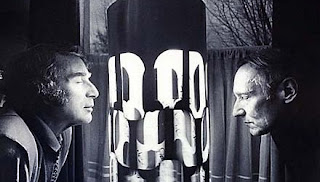Here is my performance art! According to a study published in the New York Times, The average person spends 8 hours a day looking at screens. That's more time than we sleep, and definitely more time than we spend with any people in our lives per day. Most of us spend time on our screens even when we are with our friends. So it's kind of like our phones, laptops, iPads are all our friends. So for my performance art, I decided to spend a little quality time with my friend. I went to Target with my laptop and walked around with the Finder icon up on my screen. Here it is.
Sunday, November 25, 2012
Performance Art
Here is my performance art! According to a study published in the New York Times, The average person spends 8 hours a day looking at screens. That's more time than we sleep, and definitely more time than we spend with any people in our lives per day. Most of us spend time on our screens even when we are with our friends. So it's kind of like our phones, laptops, iPads are all our friends. So for my performance art, I decided to spend a little quality time with my friend. I went to Target with my laptop and walked around with the Finder icon up on my screen. Here it is.
Flash Mobs
Although I'm super cynical when it comes to happy couples this year, I can't help but think this is the most adorable thing ever.
EVA & ADELE
II believe that words can not fully explain EVA & ADELE, so instead I decided that pictures could better describe this striking couple. This couple who go beyond the boundaries of gender and mainstream thoughts of beauty are completely unique. They claim that wherever they are is a museum. I would have to think that this is true.
Iconoclast
An iconoclast is a person who attacks cherished beliefs, traditional institutions, etc. as being based on error or superstition, or a breaker or destroyer of images, especially those set up for religious verneration. Iconoclasm has been around for almost as long as religion itself. The reasons behind this deliberate vandalism of religious artifacts vary from literal interpretation to the bible to political reasons. The first iconoclastic period was between 7256 and 730 and was spearheaded by the Byzantine Emperor Leo III the Isaurian.
Modern iconoclasm is still just as controversial as it was in the beginning. One example of such an incident was in 1972 when Lazlo Toth attacked La Pieta a Michelangelo sculpture with a hammer while claiming to be Christ. This act led to calls for Toth's death as well as a nomination for a transgressive art performance award.
Many avant-garde artists of the early 20th century preached destructive rhetoric. Duchamp himself was once quoted saying to "use a Rembrandt as an ironing board." But this school of thinking and the actual destruction of art are two different things. I feel like I am open to many different schools of thinking when it comes to art, but the destruction of religious or classic artwork can never be justified in my opinion.
Modern iconoclasm is still just as controversial as it was in the beginning. One example of such an incident was in 1972 when Lazlo Toth attacked La Pieta a Michelangelo sculpture with a hammer while claiming to be Christ. This act led to calls for Toth's death as well as a nomination for a transgressive art performance award.
Many avant-garde artists of the early 20th century preached destructive rhetoric. Duchamp himself was once quoted saying to "use a Rembrandt as an ironing board." But this school of thinking and the actual destruction of art are two different things. I feel like I am open to many different schools of thinking when it comes to art, but the destruction of religious or classic artwork can never be justified in my opinion.
Joseph Beuys
Beuys studied sculpture at the Dusseldorf Academy of Fine Arts. By the time he graduated as a master student, Beuys work consisted mainly drawings that used unconventional materials and were often difficult to interpret. In 1961, Beuys became a professor of 'monumental sculpture.' It was during his time teaching that he became internationally known. Beuys was doing a performance art at an anniversary of an assassination attempt on Hitler when students attacked the artist. Beuys continued teaching (even after being dismissed from the University), being a shaman to his students and even participated in politics the rest of his life.
Monday, November 12, 2012
Brion Gysin
Brion Gysin was an important painter, writer, and performance artist of the twentieth century. Gysin studied surrealism with the greats at a very young age. But when he was about to preview some of his work, he was expelled from the surrealist group by Andre Breton. After serving in World War II, Gysin opened a restaurant in Morocco called 1001 Nights. But four years later he would again face failure when his restaurant was closed. Moving back to Paris, Gysin moved into the Beat Hotel and discovered a Dada technique by accident. Slicing through a pile of newspapers, Gysin translated a painting technique into writing by mixing together raw words and text. Gysin's close friend William Burroughs used this cut up technique in several of his novels.
Another invention of Gysin is the Dreamachine. The dreamachine is made from a cylinder with slits cut on the side and then is placed on a rotatable object which turns the entire contraption. There is a light source in the center of the piece. With the combination of the light and the revolution, the dreamachine pulsates and gives the viewer a feeling of relaxation. The dreamachine is experienced with eyes closed. The effect of the dreamachine can be very intense and can cause the viewer to enter a hypnagogic state.
Another invention of Gysin is the Dreamachine. The dreamachine is made from a cylinder with slits cut on the side and then is placed on a rotatable object which turns the entire contraption. There is a light source in the center of the piece. With the combination of the light and the revolution, the dreamachine pulsates and gives the viewer a feeling of relaxation. The dreamachine is experienced with eyes closed. The effect of the dreamachine can be very intense and can cause the viewer to enter a hypnagogic state.
Subscribe to:
Comments (Atom)







